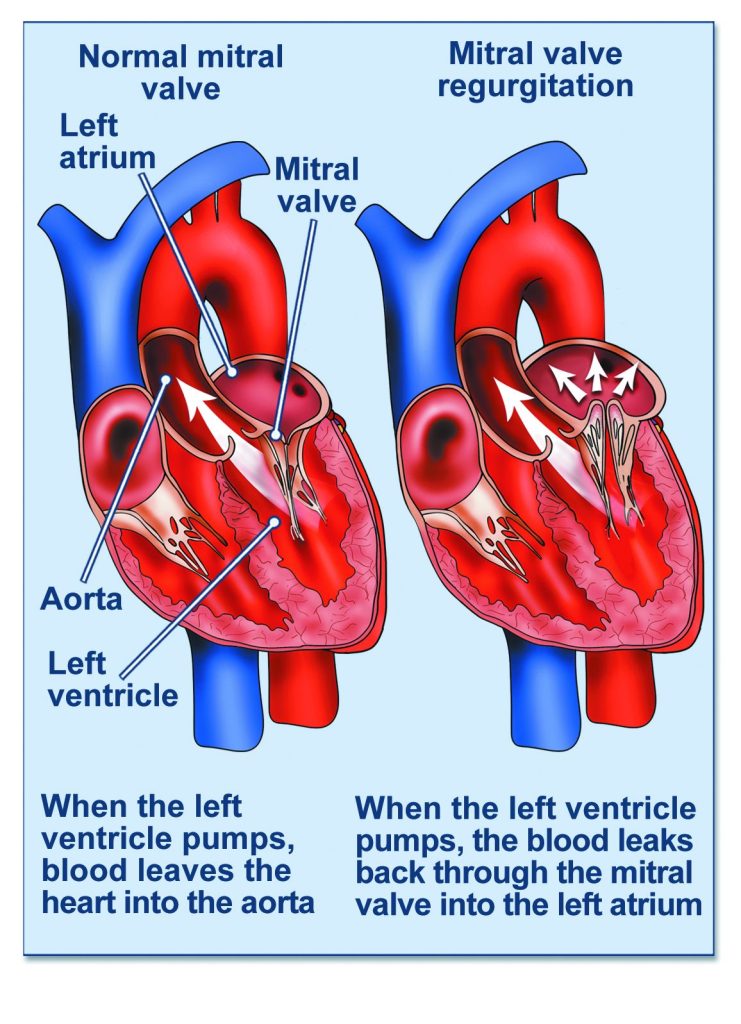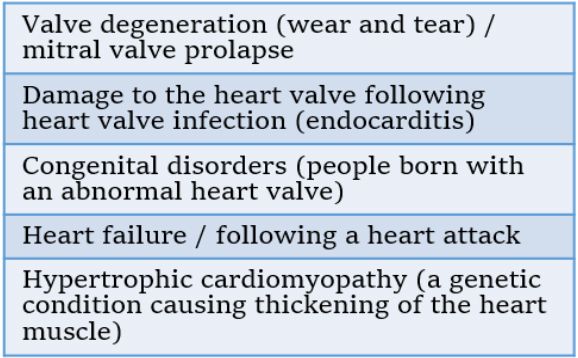
What is the mitral valve?
The mitral valve is situated on the left side of the heart. It is a one-way valve that allows blood to move from the top chamber of the heart (left atrium) to the bottom chamber (the main pump – the left ventricle).
What is mitral regurgitation?
Mitral regurgitation is a condition where this one-way valve is not working correctly. Because the valve is unable to close tightly, a leak of blood occurs when the main pumping chamber of the heart (left ventricle) contracts, allowing blood to pass back across the valve back into the top heart chamber (left atrium).
What causes mitral regurgitation?
There are many different causes of mitral regurgitation, these include:

What are the symptoms of mitral regurgitation?
Most people with mitral regurgitation will not experience any symptoms. If the regurgitation (leak) is severe, then symptoms such as exertional shortness of breath, swollen ankles and tiredness can occur.
Palpitations (a feeling of your heart beating rapidly or erratically) can also be experienced by patients with mitral regurgitation.
If you experience any of the above symptoms you should inform your Healthcare Professional.
What tests will I need?
Most people with mitral regurgitation will have an ECG and echocardiogram. Other tests outlined below may also be performed.
Electrocardiogram (ECG)
Stickers are placed on the chest and the electrical activity of the heart is recorded.
Echocardiogram (Echo or cardiac ultrasound)
During the test an ultrasound probe is placed on the chest and moving pictures of the heart are taken. The test takes around 30 minutes.
Angiogram
This is an x-ray dye test of your heart performed under local anaesthetic.
Treadmill exercise test
Stickers are placed on the chest to record the electrical activity of the heart. You are then asked to walk on a treadmill whilst your blood pressure and heart rate are monitored.
What are the treatment options available?
Most people with mitral regurgitation will not require any treatment, just regular monitoring of their condition.
If your mitral valve is severely leaky and you develop symptoms, the heart becomes severely stretched or starts to pump less efficiently, you may be referred for heart valve surgery.
What does heart surgery involve?
A series of tests before you are referred to a surgeon will decide whether you are suitable for either a mitral valve replacement or a mitral valve repair.
During a mitral valve replacement, the existing mitral valve is removed and replaced by either a metal or tissue valve. Your surgeon will discuss which type of valve would be most suitable for you. During a mitral valve repair, the surgeon will modify your existing valve to stop it from leaking.
Both these procedures require a general anaesthetic and the use of a heart-lung bypass machine. You will be left with a scar down the centre of the chest. You will usually spend 1-2 days after the operation in intensive care and are usually discharged from hospital 7-10 days after surgery.
Do I need to change my lifestyle?
62109418
As with any type of heart disease, it is important that you follow a healthy diet, keep your weight within a normal range and do not smoke. Most patients with mitral regurgitation will be encouraged to take regular gentle exercise but you should check this with your doctor. If you are planning pregnancy, you should discuss this with your doctor first and let them know immediately if you become pregnant.
Patients with mitral regurgitation are also advised to take good care of their teeth and skin to prevent the risk of heart valve infection (endocarditis), which is a rare but serious condition.
Teeth
It is important to take good care of your teeth by brushing twice a day and visiting your dentist for regular check-ups (at least once per year). If you have toothache or an abscess it is really important that you get treated for this quickly. Be sure to tell your dentist you have a heart condition.
Skin
Keep your skin clean by washing regularly. Wash any cuts and grazes and keep them clean until they heal. See your GP if your skin becomes red or inflamed. Avoid cosmetic procedures (e.g. tattoos, body piercing, fillers etc) that involve breaking the skin.
